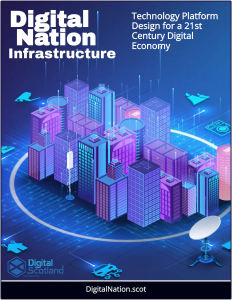 The convergence of digital twins and the metaverse is reshaping urban planning and management, offering innovative solutions for smart cities.
The convergence of digital twins and the metaverse is reshaping urban planning and management, offering innovative solutions for smart cities.
The Metaverse—a dynamic blend of virtual reality (VR), augmented reality (AR), and blockchain—ushers in an immersive digital layer where cities can be planned, experienced, and governed in revolutionary ways.
Together, these technologies are not just enhancing urban life but redefining what it means to live in a connected, intelligent city.
Digital Twins: A Foundation for Smart Cities
A digital twin is a virtual replica of a physical entity, such as a city’s infrastructure, updated in real-time with data from sensors, IoT devices, and other sources. This technology allows city planners to monitor, simulate, and optimize urban systems like transportation, energy, and water management.
For instance, Singapore’s Virtual Singapore platform integrates 3D mapping and real-time data to model urban scenarios, aiding decisions on traffic flow and infrastructure resilience. Similarly, cities like Helsinki and Amsterdam use digital twins to enhance sustainability, testing renewable energy integration and waste management strategies.
Digital twins rely on IoT, AI, and big data analytics to process vast datasets, enabling predictive maintenance and resource optimization. For example, a digital twin of a power grid can forecast outages, while one of a water system can detect leaks, reducing waste. These capabilities make digital twins essential for managing complex urban systems efficiently.
The Metaverse: Enhancing Urban Interaction
The metaverse, a shared virtual environment, complements digital twins by providing immersive platforms for urban planning and citizen engagement.
Unlike digital twins, which focus on data-driven simulations, the metaverse emphasizes user interaction, enabling stakeholders to experience and shape urban designs virtually. For instance, Seoul’s “Metaverse Seoul” initiative allows citizens to access city services and participate in virtual town halls, fostering inclusivity.
The metaverse also supports collaborative urban planning. Architects and policymakers can use virtual environments to test designs, such as new public spaces or transit systems, before implementation. This reduces costs and risks by identifying issues early. For example, a virtual model of a proposed skyscraper can simulate its impact on traffic or sunlight, allowing adjustments before construction begins.
Pioneers like Seoul for next generation for tourism and public services. This platform, called Metaverse Seoul, allows users to play games, chat, hold meetings, get advice on setting up a business, file public documents, and visit Seoul’s famous tourist attractions.
Synergy of Digital Twins and the Metaverse
Combining digital twins with the metaverse creates a powerful tool for smart cities. Digital twins provide the data backbone, while the metaverse offers an interactive interface for stakeholders to engage with that data. This synergy enables real-time urban management and long-term planning.
Consider the journey of Niantic, a company once synonymous with Pokémon Go, which has boldly pivoted to form Niantic Spatial—a venture dedicated to geospatial AI. By leveraging vast datasets crowdsourced from millions of players, Niantic Spatial is crafting digital maps of unparalleled detail, poised to empower robotics, AR smart glasses, and autonomous navigation.
For instance, a digital twin of a city’s transport system can feed data into a metaverse platform, where planners and citizens collaborate to optimize bus routes or reduce congestion.
This integration also enhances citizen participation. Virtual town halls in the metaverse allow residents to interact with urban models, voice concerns, and propose solutions, democratizing city planning. Cities like Dubai are exploring such platforms to involve communities in sustainable development projects, ensuring urban growth aligns with residents’ needs.
Challenges and Considerations – The Future of Smart Cities
Despite their potential, these technologies face challenges. Data privacy is a major concern, as digital twins rely on vast amounts of personal and urban data. Robust cybersecurity and transparent data governance are essential to maintain trust. Interoperability is another hurdle, as integrating diverse systems requires standardized protocols. Additionally, the digital divide—unequal access to technology—could exclude marginalized communities, necessitating inclusive policies.
The high cost of implementation, including hardware, software, and skilled personnel, poses a barrier, particularly for smaller cities. Scalable, cost-effective solutions, such as cloud-based platforms, can help. Ethical concerns, like bias in AI algorithms or metaverse accessibility, also require careful oversight to ensure equitable benefits.
As digital twins and the metaverse evolve, their integration will redefine urban living. Advances in AI, 5G, and edge computing will enhance real-time data processing, making digital twins more accurate. Meanwhile, immersive technologies like AR and VR will make the metaverse more engaging, transforming how citizens interact with cities.
Governments and private sectors must collaborate to address challenges and scale these technologies. Pilot projects in cities like Toronto and Shanghai show promise, with digital twins optimizing energy grids and metaverse platforms enhancing public services. By investing in infrastructure, skills, and inclusive policies, cities can harness these innovations to become more sustainable, resilient, and citizen-centric.
Digital twins and the metaverse are revolutionizing smart cities by enabling data-driven management and immersive engagement. Their synergy offers a pathway to more efficient, sustainable, and inclusive urban environments. While challenges like privacy and cost remain, strategic investments and ethical frameworks can unlock their full potential, paving the way for next-generation cities that prioritize both technology and human well-being.



